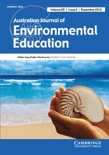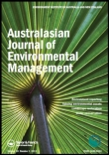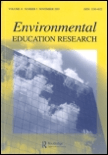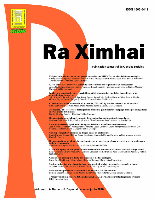
Australian Journal of Environmental Education
Scope & Guideline
Empowering educators for a sustainable future.
Introduction
Aims and Scopes
- Environmental Education Policy and Practice:
The journal explores the intricacies of environmental education policies and their practical implications across various educational contexts, including formal and informal settings. - Indigenous Perspectives and Knowledge Systems:
A significant focus is placed on integrating Indigenous knowledge and perspectives into environmental education, promoting cultural relevance and sustainability. - Multispecies and Posthuman Pedagogies:
The journal investigates innovative pedagogical approaches that consider the interconnectedness of human and non-human entities, fostering a more inclusive understanding of environmental education. - Climate Change and Sustainability Education:
AJEE emphasizes the role of education in addressing climate change, exploring strategies for fostering environmental stewardship and pro-environmental behaviors among learners. - Community Engagement and Activism:
Research published in AJEE often highlights the importance of community involvement, activism, and participatory approaches in environmental education, encouraging collaborative efforts for sustainability.
Trending and Emerging
- Posthumanism and Multispecies Relations:
Recent publications increasingly focus on posthumanist perspectives, emphasizing the interconnectedness of all life forms and advocating for educational practices that recognize multispecies relationships. - Indigenous Knowledge Integration:
There is a growing trend towards incorporating Indigenous knowledge systems into environmental education, recognizing their importance in fostering sustainability and ecological understanding. - Critical Pedagogies and Activism:
Emerging themes highlight the role of critical pedagogies that empower learners to engage in activism, challenging existing paradigms and advocating for social and environmental justice. - Digital and Technological Innovations in Education:
The integration of digital technologies in environmental education is gaining traction, with research exploring how these tools can enhance engagement and learning outcomes. - Climate Justice and Equity Issues:
A notable increase in discussions surrounding climate justice and equity reflects a commitment to addressing social dimensions within environmental education, ensuring inclusivity and representation.
Declining or Waning
- Traditional Environmental Education Methods:
There is a noticeable decrease in the prevalence of traditional environmental education methods that focus solely on knowledge dissemination without engaging learners in active problem-solving or critical thinking. - Single-species Conservation Focus:
The journal has moved away from a singular focus on species conservation to a broader consideration of multispecies relationships and ecosystems, indicating a shift towards more holistic environmental understandings. - Generalized Awareness Campaigns:
Previous trends in promoting generalized environmental awareness campaigns are waning, as the journal now favors more nuanced discussions on specific issues and targeted educational interventions.
Similar Journals

Australasian Journal of Environmental Management
Empowering voices in the realm of environmental stewardship.The Australasian Journal of Environmental Management is a highly regarded publication in the field of environmental studies, published by Taylor & Francis Ltd. With an ISSN of 1448-6563 and an E-ISSN of 2159-5356, this journal serves as a pivotal platform for disseminating innovative research and insights pertaining to the management of environmental resources across Australia and broader geographical contexts. The journal has achieved impressive rankings, including a Q2 classification in Geography, Planning and Development and a Q3 in Management, Monitoring, Policy and Law for 2023, highlighting its relevance and impact within the academic community. Researchers and professionals are encouraged to contribute to its mission of advancing knowledge and practices in sustainable environmental management. With a publication history spanning from 1996 to 2024, the journal remains committed to fostering interdisciplinary collaboration and critical discourse on environmental challenges. While access options may vary, the significance of this journal as a resource for students and practitioners alike cannot be overstated, as it shapes contemporary perspectives on environmental policy and management.

M+A-Revista Electronica de Medio Ambiente
Fostering Interdisciplinary Solutions to Environmental ChallengesM+A-Revista Electronica de Medio Ambiente, published by Universidad Complutense de Madrid, Servicio Publicaciones, is a leading open-access journal dedicated to advancing the field of environmental science and policy. With an ISSN of 1886-3329, this journal serves as a vital platform for researchers, professionals, and students to disseminate innovative findings and insights related to environmental issues, sustainability practices, and ecological conservation. The journal aims to foster interdisciplinary collaboration and strengthen the dialogue between academia and practitioners in addressing pressing environmental challenges. Situated in Madrid, Spain, it actively contributes to the global discourse on ecological matters, encouraging the submission of high-quality research articles, reviews, and case studies. By providing accessible and relevant content, M+A-Revista Electronica de Medio Ambiente significantly impacts the advancement of knowledge in this critical domain.

Revista Internacional de Educacion para la Justicia Social
Transforming Education for a Just SocietyRevista Internacional de Educacion para la Justicia Social is a prominent academic journal published by the Universidad Autónoma de Madrid, Facultad de Formación de Profesorado y Educación. Since its inception in 2012, this Open Access journal has made significant contributions to the fields of education, sociology, and political science, achieving impressive rankings, including Q2 in Education and Q1 in Sociology and Political Science as of 2023. The journal, with ISSN 2254-3139, serves as an essential platform for researchers, professionals, and students interested in fostering social justice through education. With its commitment to accessible scholarship, the journal features high-quality research aimed at promoting equity and inclusivity in educational practices globally. By 2024, it aims to further expand its scope and impact within the academic community, maintaining its dedication to engaging and transformative discourse.

Uni-pluriversidad
Exploring Interdisciplinary Pathways to LearningUni-pluriversidad is a prominent academic journal based in Colombia, published by UNIV ANTIOQUIA, within the GRUPO CHHES. Since its establishment in 2001, it has championed the principles of open access, providing a platform for a diverse range of interdisciplinary research that spans the fields of education, cultural studies, and social sciences. With an ISSN of 1657-4249 and an E-ISSN of 2665-2730, this journal aims to foster dialogue among scholars and practitioners, making research easily accessible to a global audience. Although specific metrics such as H-index and Scopus rankings are currently unavailable, Uni-pluriversidad's vision is to contribute substantially to academic discourse and to promote innovative and pluralistic approaches to learning and research. Its commitment to disseminating knowledge aligns with current trends in academia that emphasize collaboration and inclusivity, making it an essential resource for researchers, professionals, and students alike.

Environmental Education Research
Elevating Environmental Awareness through EducationEnvironmental Education Research is a prestigious journal published by Routledge Journals, Taylor & Francis Ltd, specializing in the intersection of education and environmental studies. With an impact factor that underscores its significance, the journal is categorized in Q1 in Education and ranks #190 out of 1543 in the Scopus Social Sciences Education category, placing it in the 87th percentile—a testament to its influence and relevance. Established in 1995 and converging until 2024, this journal provides a vital platform for researchers and educators to explore innovative research, best practices, and critical discussions surrounding environmental education. While it does not currently offer open access options, the journal ensures a rigorous peer-review process that maintains high scholarly standards, making it an essential resource for anyone looking to deepen their understanding of how education can address environmental challenges. Located in the United Kingdom, it brings together a global community of scholars dedicated to fostering a sustainable future through education.

EARI-Educacion Artistica-Revista de Investigacion
Disseminating Knowledge for a Creative FutureEARI-Educacion Artistica-Revista de Investigacion is a distinguished peer-reviewed journal that explores the intersection of art and education, published by the University of Valencia's Department of Prehistory and Archaeology. With its commitment to advancing knowledge in artistic education, the journal serves as a pivotal platform for scholars, educators, and practitioners to share innovative research and transformative practices in the field. Since embracing an Open Access model in 2011, EARI has facilitated broader dissemination of research findings, ensuring that the insights and contributions of its authors reach a global audience. While specific ranking metrics such as HIndex and Scopus ranks are not provided, the journal remains recognized for its scholarly rigor and relevance within the arts education community. Researchers, professionals, and students looking to stay at the forefront of artistic education will find EARI an invaluable resource for contemporary discussions, methodologies, and pedagogical approaches in the discipline.

Revista Eletronica Pesquiseduca
Bridging Theory and Practice in Education ResearchRevista Eletronica Pesquiseduca is a prominent academic journal published by EDITORA UNIV LEOPOLDLANUM in Brazil, dedicated to the advancement of research in the field of education. With its rich focus on interdisciplinary studies, the journal aims to disseminate high-quality scholarly articles that contribute to the development and understanding of educational practices and policies. Although specific metrics such as Impact Factor and H-Index are currently undisclosed, the journal is poised to foster significant dialogue among researchers, educators, and practitioners alike. As an open-access platform, it attains a wide reach, ensuring that knowledge is accessible to all stakeholders in the educational landscape. With a commitment to promoting innovative research and inclusive educational practices, Revista Eletronica Pesquiseduca stands as an essential resource for those looking to make impactful contributions to the field of education.

Journal of Australian Political Economy
Navigating the nexus of sociology and economics.Journal of Australian Political Economy, published by the Australian Political Economy Movement, serves as a crucial platform for interdisciplinary scholarship in the realms of political economy, sociology, and economics. With an ISSN of 0156-5826 and an E-ISSN of 1839-3675, this esteemed journal is known for its rigorous peer-reviewed articles that contribute to the understanding of economic issues and their sociopolitical contexts in Australia and beyond. Indexed in Scopus, it holds impressive quartile rankings—Q2 in Sociology and Political Science and Q3 in Economics and Econometrics—demonstrating its relevance and impact within the academic community. The journal's emphasis on qualitative and quantitative analyses encourages researchers to explore critical themes that shape societal structures and economic policies, making it an essential resource for students, scholars, and professionals aiming to deepen their understanding of political economy. With a convergence period from 2008 to 2024, the Journal of Australian Political Economy continues to forge new paths in scholarly discourse and provide cutting-edge insights into pressing societal issues.

Revista Ra Ximhai
Fostering Understanding of Indigenous Knowledge and CultureRevista Ra Ximhai is a distinguished academic journal published by Universidad Autónoma Indígena de México, specializing in interdisciplinary studies related to indigenous knowledge, culture, and socioeconomic issues. Since its inception as an Open Access publication in 2005, the journal has championed the dissemination of research that amplifies indigenous voices and perspectives, fostering an enriched understanding of various fields including anthropology, sociology, and environmental studies. Although it does not currently have an H-index or Scopus rankings, Revista Ra Ximhai remains vital for researchers, professionals, and students who are engaged in or studying indigenous rights and cultural preservation. With a commitment to scholarly excellence and accessibility, the journal makes significant contributions to its field, making it an invaluable resource for those dedicated to the advancement of knowledge regarding indigenous communities, especially in Latin America.

Journal of Environmental Studies and Sciences
Connecting ideas to foster environmental stewardship.Journal of Environmental Studies and Sciences, published by SPRINGER, serves as a pivotal platform for advancing the field of environmental science and related disciplines. With an ISSN of 2190-6483 and E-ISSN of 2190-6491, this esteemed journal has established itself as a reputable source of knowledge since its inception in 2011. Covering an expansive range of topics related to environmental studies, the journal has achieved a commendable position within the academic community, evidenced by its 2023 category quartiles, ranking in the Q2 tier for both Environmental Science (miscellaneous) and Geography, Planning and Development. The journal's Scopus rankings further highlight its impact within the fields of Geography, Planning and Development, and General Environmental Science, boasting a respectable percentile rank of 69th and 58th respectively. Although it does not currently offer Open Access, the Journal of Environmental Studies and Sciences remains an essential resource for researchers, professionals, and students aiming to explore critical environmental issues, engage with innovative research, and contribute to sustainable development practices. Its ongoing commitment to academic rigor ensures that it continues to play a vital role in shaping the discourse around environmental challenges and solutions.